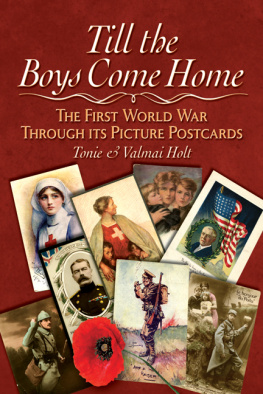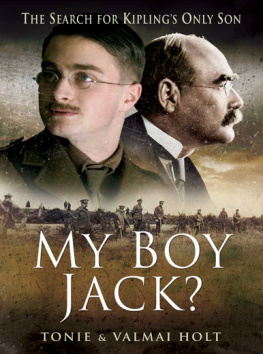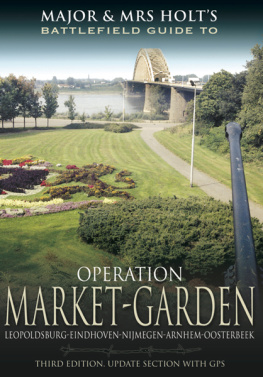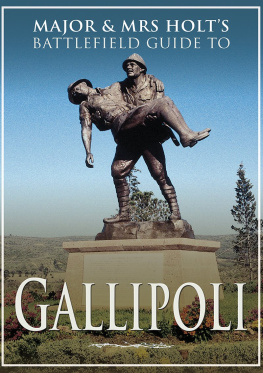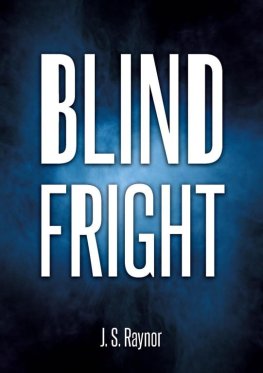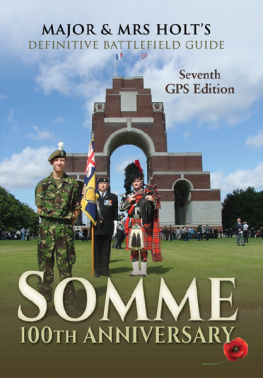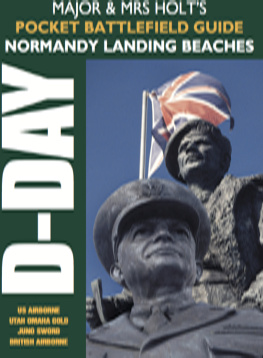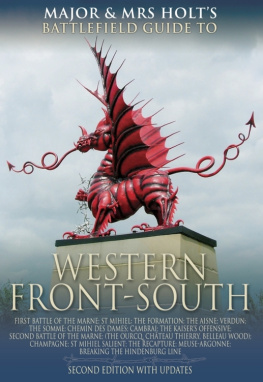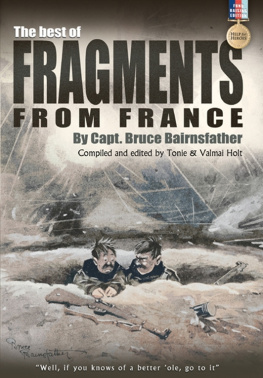Tonie Holt - Till the Boys Come Home
Here you can read online Tonie Holt - Till the Boys Come Home full text of the book (entire story) in english for free. Download pdf and epub, get meaning, cover and reviews about this ebook. year: 2014, publisher: Pen & Sword Books, genre: History. Description of the work, (preface) as well as reviews are available. Best literature library LitArk.com created for fans of good reading and offers a wide selection of genres:
Romance novel
Science fiction
Adventure
Detective
Science
History
Home and family
Prose
Art
Politics
Computer
Non-fiction
Religion
Business
Children
Humor
Choose a favorite category and find really read worthwhile books. Enjoy immersion in the world of imagination, feel the emotions of the characters or learn something new for yourself, make an fascinating discovery.
- Book:Till the Boys Come Home
- Author:
- Publisher:Pen & Sword Books
- Genre:
- Year:2014
- Rating:4 / 5
- Favourites:Add to favourites
- Your mark:
- 80
- 1
- 2
- 3
- 4
- 5
Till the Boys Come Home: summary, description and annotation
We offer to read an annotation, description, summary or preface (depends on what the author of the book "Till the Boys Come Home" wrote himself). If you haven't found the necessary information about the book — write in the comments, we will try to find it.
Till the Boys Come Home — read online for free the complete book (whole text) full work
Below is the text of the book, divided by pages. System saving the place of the last page read, allows you to conveniently read the book "Till the Boys Come Home" online for free, without having to search again every time where you left off. Put a bookmark, and you can go to the page where you finished reading at any time.
Font size:
Interval:
Bookmark:

DEDICATION
To Efa and Joe, who served on the Home Front, to R.J., who served at Sea, and to our children, Sian and Gareth, to our granddaughters Jessica and Rebecca and to all who served in The Great War on land, air and sea and on the Home Front.
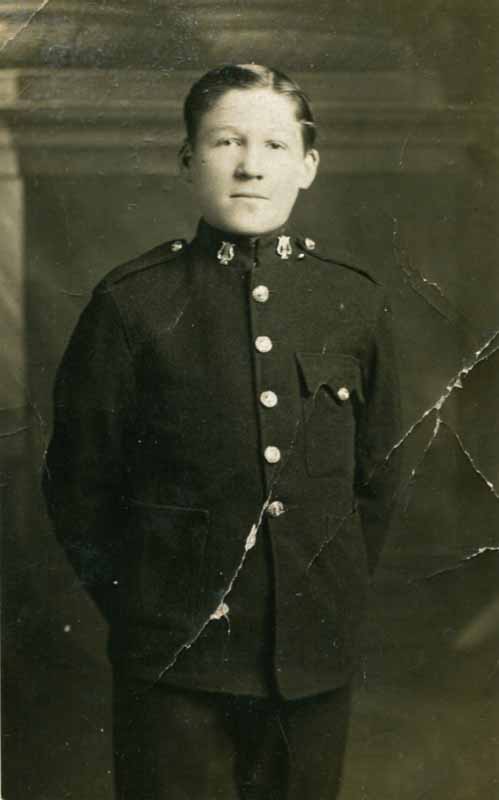
Robert James Holt (father of co-author Tonie Holt) who joined the Royal Marines as a bandboy in 1914 at the age of 14 and served on HMS Inflexible at the Battle of Jutland one year later. I didnt see a thing , he said, I was below decks. British: (Pub. T. Humphries, Southsea)

First published 1977 by Macdonald & Janes Publishers Ltd.
This updated edition 2014, published
by Pen & Sword Military
an imprint of
Pen & Sword Books Ltd
47 Church Street
Barnsley
South Yorkshire
S70 2AS
Copyright Tonie and Valmai Holt 2014
ISBN 978 1 47382 352 5
eISBN 9781473841017
The right of Tonie and Valmai Holt to be identified as the Authors of this Work has been asserted by them in accordance with the Copyright, Designs and Patents Act 1988.
A CIP catalogue record for this book is available from the British Library.
All rights reserved. No part of this book may be reproduced or transmitted in any form or by any means, electronic or mechanical including photocopying, recording or by any information storage and retrieval system, without permission from the Publisher in writing.
Typeset in Ehrhardt by
Mac Style Ltd, Bridlington, East Yorkshire
Printed and bound in India by Replika Press Pvt Ltd
Pen & Sword Books Ltd incorporates the imprints of Pen & Sword Archaeology, Atlas,
Aviation, Battleground, Discovery, Family History, History, Maritime, Military, Naval,
Politics, Railways, Select, Transport, True Crime, and Fiction, Frontline Books, Leo Cooper,
Praetorian Press, Seaforth Publishing and Wharncliffe.
For a complete list of Pen & Sword titles please contact
PEN & SWORD BOOKS LIMITED
47 Church Street, Barnsley, South Yorkshire, S70 2AS, England
E-mail: enquiries@pen-and-sword.co.uk
Website: www.pen-and-sword.co.uk
B elow is the original Foreword to the 1977 Edition. It was written by WW1 veteran writer and journalist, Eric Hiscock. He was then in the public eye for his supposedly realistic and autobiographical account of his WW1 experience as an under-age soldier, The Bells of Hell Go Ting-a-Ling-a-Ling , also published that year. Today it is rated as highly exaggerated, controversial, somewhat unreliable factually, and, among other criticisms, obsessed with homosexuality. It is still a cracking good read and he was actually there!
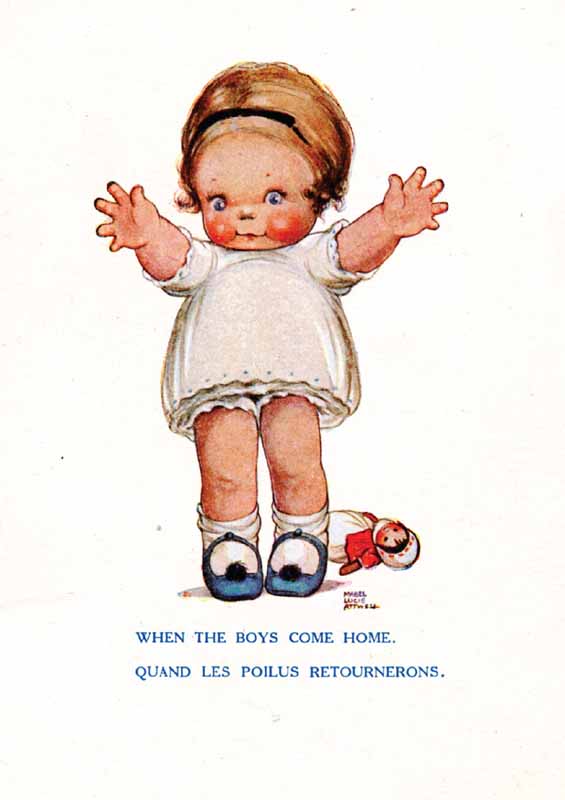
By well-known and prolific artist of chubby children, Mabel Lucie Attwell. Many of the boys didnt come home until 1920. British .
W hen I left home in 1915 to join the 29th Battalion, Royal Fusiliers, there was an album in the house nearly full of postcards. They had been sent to me, my brother or sister, or my parents by schoolfriends, relations, or sometimes by chance acquaintances met on seaside holidays. Nobody flew to Corfu those days. More than forty years later I read a novel of Graham Greenes, Our Man In Havana , in which a character observes: A picture-postcard is a symbol of loneliness. Looking through this quite remarkable collection of cards of nations at war I can only conclude, if Graham Greenes character was right, there were an awful lot of lonely people in the world during 1914-1918. There were, of course. We were lonely in the trenches. Comradeship that arrived with dirt, danger and death, helped enormously, but it was the post from home that made such a degraded form of life endurable. There are many postcards in this book, so energetically collected and so brilliantly presented by Tonie and Valmai Holt, that I recognise. Some, especially the Austrian artist, Raphael Kirchners, I remember seeing on the damp walls of dugouts, wartime pin-ups that brought with their La Vie Parisienne near-nudity a moment or two of relief from the rat-infested, water-logged, mud-filled holes that sheltered men from the mad, death-dealing outside world of Nomansland. We, on the other hand, could send back only those printed, monosyllabic Field Postcards (I am well, I am in receipt of your letter, I am wounded or words like that) except when, out of the Front Line, in some small, shell-shocked village, it was still possible to buy, for a few centimes, some sentimental postcard printed in Paris. Such shy-making cards have, inevitably, been corraled in this volume by the Holts. The card-sending habit died, in the main, when the Great War ended and stamps for cards went up from a halfpenny to a penny. Now there will be no time for sending such blatantly propagandist, heart-stirring, comic messages in any future war. Nuclear fission will not allow leisure enough for loving messages.
Such a thought helps to make this book the treasure house it is. There can never be another like it. It represents an innocent industry that was buried along with most of the recipients of the postcard pictured here.

ERIC HISCOCK
NOTE TO 2014 EDITION
By the time the 100th Anniversary of the WW1 Armistice is reached in 2018, every one of the some 750 original postcards in this book will also be at least 100 years old. No longer will they be just, scraps of paper, but treasured historical documents, unwitting contemporary observers of the war in all of its aspects.
This completely revised edition contains many new images from both sides, some of them extremely rare and valuable propaganda cards
The universality of information via the internet has enabled us to expand some of the picture captions beyond what we were able to do with the first edition, but we have left the central narrative untouched.
Internet sites like e-bay and a variety of international auction houses, have brought the value and significance of the contemporary picture postcard to a wider audience including schoolchildren, and these simple pictures, sometimes with their poignant messages, are a wonderful introduction to the young of the price that was paid for the freedoms that we enjoy today.
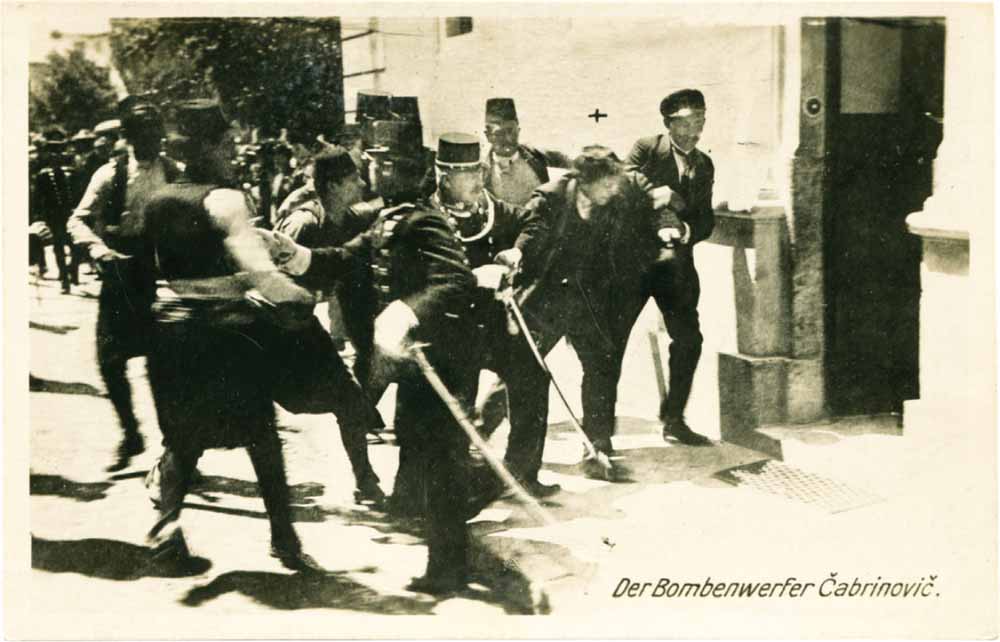
An extremely rare card showing the arrest of Archduke Franz Ferdinand of Austrias would-be assassinator, The Bomb-thrower, Cabrinovic on June 28 1914 at Sarajevo. Cabrinovics bomb missed the Archduke and, despite swallowing a cyanide capsule and jumping into the River Miljacka , this member of the Black Hand secret organisation was fished out and arrested. Austrian .
I n 1914, much to his later embarrassment, H.G. Wells, then revered as Britains foremost man of letters, called the Great War The War that will end War. We know now that it was simply the beginning of technological warfare that has today reached a level of development where any nuclear power has the capability of annihilating millions perhaps even of ending our world. Between 1914 and 1919, the years of holocaust, many irreplaceable things died. Almost an entire generation of the manhood of the combatant nations was killed. Certain national attitudes and beliefs began to die after the War, such as the British jingoism of blind faith unto death for King and Country. Others disappeared altogether, for example, a narrow moral code about women and their place in society. The end of the War was the end of an era.
Font size:
Interval:
Bookmark:
Similar books «Till the Boys Come Home»
Look at similar books to Till the Boys Come Home. We have selected literature similar in name and meaning in the hope of providing readers with more options to find new, interesting, not yet read works.
Discussion, reviews of the book Till the Boys Come Home and just readers' own opinions. Leave your comments, write what you think about the work, its meaning or the main characters. Specify what exactly you liked and what you didn't like, and why you think so.

